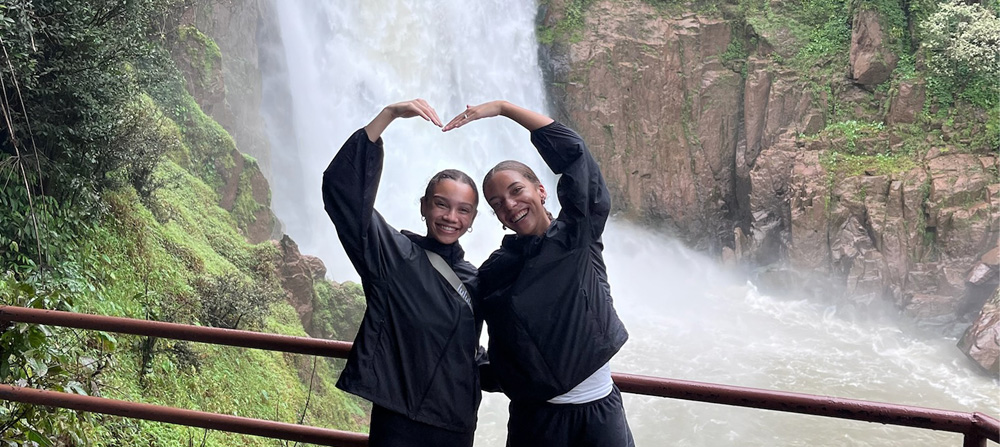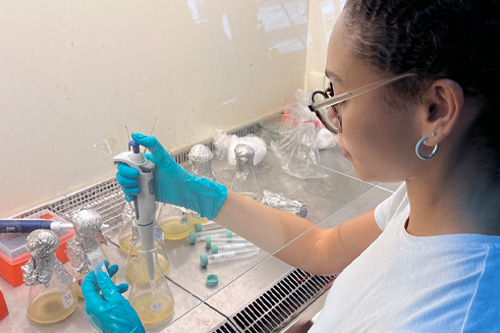Media
Contact
Communications Specialist
Faculty of Engineering
Spencer Engineering Building
Room 2072
Western University
Tel: 519-661-2111 ext. 87015
Email: engineeringcomms@uwo.ca
Western Engineering students gain global research experience in Thailand

Western Engineering students Alyssa Forbes (left) and Sabrina Lindow (right) spent the summer in Bangkok, Thailand, gaining hands-on research experience through the Undergraduate Summer Research Internship (USRI) program. (Submitted)
This summer, two Western Engineering students traded lecture halls for laboratories halfway across the world, immersing themselves in cutting-edge research and an entirely new culture.
Fourth-year biochemical engineering student Alyssa Forbes and fourth-year chemical engineering student Sabrina Lindow spent three months in Bangkok, Thailand, participating in the Undergraduate Summer Research Internships (USRI) program under the supervision of Lars Rehmann, associate dean, graduate and postdoctoral studies at Western Engineering. The program gives undergraduates the chance to work alongside faculty mentors on real-world research challenges, building technical skills and professional confidence in preparation for future careers.
 Forbes joined a project titled "Conversion of ferulic acid into vanillin by fermentation" — a quest to develop a more sustainable way to produce one of the world’s most popular flavour compounds. While most vanilla products rely on synthetic vanillin made from petrochemicals, Forbes’ work focused on converting plant-based ferulic acid — found in rice bran and corn husks — into vanillin through microbial fermentation. She experimented with pH levels to determine optimal conditions for vanillin production, learning techniques such as spectrophotometry and high-performance liquid chromatography along the way.
Forbes joined a project titled "Conversion of ferulic acid into vanillin by fermentation" — a quest to develop a more sustainable way to produce one of the world’s most popular flavour compounds. While most vanilla products rely on synthetic vanillin made from petrochemicals, Forbes’ work focused on converting plant-based ferulic acid — found in rice bran and corn husks — into vanillin through microbial fermentation. She experimented with pH levels to determine optimal conditions for vanillin production, learning techniques such as spectrophotometry and high-performance liquid chromatography along the way.
“This research is a step towards creating environmentally friendly ways to produce an ingredient we use every day,” Forbes said. “If successful, it could reduce our dependence on synthetic chemicals, benefiting both the environment and industries seeking sustainable alternatives.”
Lindow’s project, "Microencapsulation of essential oils using complex coacervation," explored how microencapsulated oils could be used in a low-cost smell test to detect early signs of Parkinson’s Disease. Since a loss of smell often precedes motor symptoms, such a test could help patients receive earlier diagnoses and treatment. Working in collaboration with Chulalongkorn University, she adapted existing smell test technology to be culturally relevant for Thai patients, using locally recognizable scents such as lemongrass instead of North American staples like cinnamon.
“This project reframed how I think about my responsibility as an engineer,” Lindow reflected. “Even small design details — like choosing scents familiar to a specific culture — can determine whether a solution works in the real world.”
Both students found that their time in Bangkok was as much about personal growth as it was about technical learning. They navigated busy streets, tried new foods, adapted to the pace of life, and embraced the moments between lab sessions — from riding tuk-tuks at night to watching the city pause during tropical downpours.
“Whether or not you love lab work, research teaches you independence, adaptability, and collaboration,” Forbes said. “It helps you grow not just as a student, but as a person.”
Lindow agreed, adding: “Don’t be afraid to ask about research opportunities. You never know what doors it might open — for me, it turned my horizon global.”
The USRI program proved to be more than an academic exercise; it was a transformative experience that combined problem-solving with cultural discovery, leaving both students inspired to carry their new perspectives into future careers in engineering.

